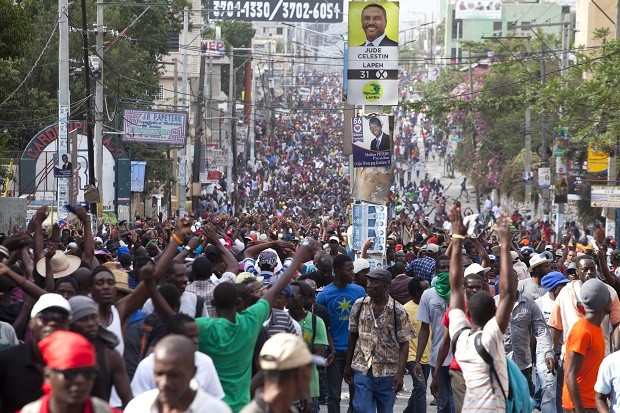Haiti delays presidential runoff again in electoral dispute

Demonstrators march during a street protest after it was announced that the runoff Jan. 24, presidential election had been postponed, in Port-au-Prince, Haiti, Friday, Jan. 22, 2016. The Provisional Electoral Council in Haiti has postponed the election amid escalating protests by the opposition, which claims the first round was marred by fraud in favor of a government-backed candidate. AP
PORT-AU-PRINCE, Haiti — A presidential runoff that had already been delayed once and faced deep public skepticism was put on hold indefinitely Friday as Haiti’s leaders sought to negotiate a resolution to what threatens to become a constitutional crisis.
The Provisional Electoral Council decided to postpone Sunday’s vote because there is “too much violence throughout the country,” council president Pierre-Louis Opont said at a news conference. In recent days, a number of election offices across the impoverished nation have been burned and the capital has been rocked by violent opposition protests calling for a halt to the runoff.
The council did not set a new date for the vote. It also did not say whether an interim government would take power after Feb. 7, when President Michel Martelly is required to leave office under the Constitution, or if he would remain until a replacement is elected.
READ: President: Haiti runoff vote will take place as scheduled
Martelly had been expected to address the issue in a speech to the nation Friday evening, but he canceled his address without giving a reason. Administration officials instead met in an extraordinary council of ministers to discuss public order and security.
Article continues after this advertisementGovernment opponents have insisted that the first round of presidential balloting Oct. 25 was marred by massive fraud in favor of the president’s hand-picked successor, businessman Jovenel Moise. The runoff was originally supposed to be held Dec. 27, then rescheduled for Sunday.
Article continues after this advertisementJude Celestin, also a businessman and the other candidate in the runoff, said he would boycott the vote, though his name remained on the ballot.
Neither candidate immediately returned messages seeking response to the electoral council’s decision.
Protests have grown increasingly violent in recent days, prompting the council to conclude it was too risky to try to hold the vote. Haiti has only a shaky handle on security even with the assistance of troops and police from a UN peacekeeping force that has been in the country since a 2004 uprising ousted then-President Jean-Bertrand Aristide.
Schools that serve as election centers and voting stations in various towns have been attacked and set on fire in recent days, and election materials in a remote part of the country were hijacked by gunmen, Opont said.
Recent opposition-stoked protests in Port-au-Prince have ramped up the tension with rock-throwing partisans and burning street barricades.
Thousands of demonstrators cheered in celebration Friday after hearing the vote would be postponed. Groups of mostly young men then proceeded to Petionville, a hillside district that is home to some of Haiti’s wealthiest citizens, where they smashed car windows, set some vehicles alight and hurled rocks at police.
In the evening, the smoldering remnants of flaming barricades could be seen in downtown Port-au-Prince. Motorists were still forced to swerve around burnt tires and shattered windshields, but roadside eateries began to reopen.
There has been growing concern that a flawed runoff might push the perennially volatile country of 10 million people to the edge of tumult, rolling back a decade of relative political stability and putting the brakes on foreign investment.
Elections are always a struggle in Haiti. It saw its first genuinely democratic election in 1990, closely followed by a coup d’etat. While there have been no shortage of opposition boycotts since, this is the first time that a presidential candidate is boycotting a runoff after qualifying for it.
Celestin recently told The Associated Press that Haiti was “moving toward a selection, not an election.” He said the US and other foreign governments that monitor Haiti were complicit for supporting flawed elections.
Haiti’s Senate and various religious, business and civil-society groups had called for a halt to Sunday’s runoff due to public suspicion of fraud and concerns about instability.
Martelly had said the runoff would go on as scheduled and accused the opposition of trying to derail the vote with bogus accusations so a transitional government they would dominate could be set up.